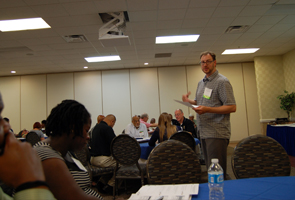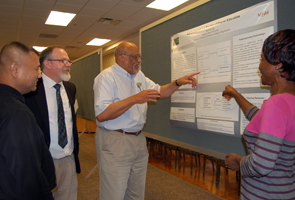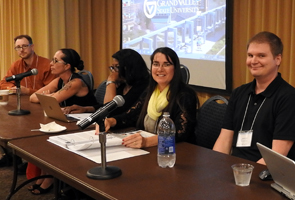Workshop Materials Packet
All workshop materials should be submitted in a single editable, Word file, ideally no more than 8 pages in length. The packet should include the following:
|
Title Presenters (name and affiliation) Overview
Learning Outcomes
Plan
Resources
|
Submission Dates & Deadlines
- Dec 15: Proposal submission due
- Jan 15: Notification
- Feb 15: Photo due (submit HERE)
- Feb 15: Biosketch due (submit HERE)
- Apr 1: Materials due (submit HERE)
Please note that all
session materials will either be included in the conference binder (which every attendee receives)
and/or made available online. If you wish to bring handouts that you will distribute during your workshop, you are welcome to do so.
If you have prerequisite readings or
pre-activities for your workshop,
please indicate this in your
facilitation plan and be sure to
include the readings or activity
resources with the package of
materials you submit.

These workshops will present a learning experience for participants so they can transfer these practices to their unique campus situations. The workshop experience should model PE principles and be designed so that participants can facilitate a similar workshop on their own campus. Your proposal should include an abstract that explains the nature of the workshop, intended outcomes, and how those outcomes will be realized. If accepted, you will also need to submit a facilitation plan for inclusion in the program binder, along with all workshop materials. Workshop materials should include what participants would need to facilitate the same workshop at their own school; the point of these workshops is to transfer the practices that increase student success. The workshop should be designed to accommodate up to 50 participants who will be sitting at tables of 6 to 8 participants each.
Planning
Design a learning experience for participants that will transfer much of the ownership of the learning to participants through an emphasis on learning-by-doing in a performance environment (hands-on, minds-on)Incorporate teams as an organizational base for participant contributions Consider using elements of learning by inquiry, reflection, ongoing assessment, and discussion.Workshop Summary VIEW EXAMPLE (MS Word) VIEW TEMPLATE (MS Word)

The Poster Sessions at the Process Education Conference are a venue for sharing specific innovations that apply certain principles of Process Education.
Planning
Clearly identify your innovation to ensure it fits into the context of Process Education and the conference theme.

For each of the Symposium topics, a facilitator will provide the opportunity for each panel member to present a 5-minute overview of their Big Idea (which will already be available in the program binder). After these overviews, there will be a lively 60-minute facilitated discussion among the panel members, with the goal of expanding understanding, challenging assumptions, and making new discoveries.
Formal Paper Guidelines
Concept Paper Guidelines
Write 1 to 2 pages, sharing the essence of your Big Idea. Explain what it is, how it is or should be implemented, and any future expectations or additional information.
Symposia Guidelines
Expect to...
- introduce yourself to session the session moderator or few audience members, etc.
- provide the audience and other panel members with a brief overview (no more than 5 minutes) of your Big Idea (do not read or reproduce parts of your paper for the audience)
- invite fruitful discussion regarding certain elements of your Big Idea
- engage in a lively discussion with all other members of the panel, as well as the symposium facilitator
- think on your feet, consider new ideas, share on-the-fly assessment feedback, and engage with humor and scholarly good will

Research Papers are intended to provide an opportunity for participants to share scholarly work or work-in-progress focused on new learning theory, organization and delivery of curricular and co-curricular activities, advancements in teaching/learning practices in the classroom, professional development, assessment of learning, or educational leadership. The proceedings will contained the accepted peer-reviewed papers. For work-in-progress, the participants will provide feedback to help the author prepare a final draft for submission to a venue such as the International Journal of Process Education. If desired, the session also presents an opportunity to reach out and engage potential collaborators in finalizing their work.
Paper Guidelines (a Resarch Paper should consist of the following)
- Paper title
- Authors’ name and affiliations
- 100-150 word abstract
- Introduction section following the abstract and preceding the main body of the paper
- The main body of the paper, divided into appropriate sections
- Figures and tables, if any, must be embedded at appropriate locations within the paper
- A conclusion or summary section following the main body of the paper
- List of references
- Papers may include acknowledgments, appendices, a glossary of words and symbols
Sample Research Papers may be found in the current or previous editions of the International Journal of Process Education.
“Isn't that exactly the definition of biography? An artificial logic imposed on an 'incoherent succession of images'?” ― Milan Kundera
Contact Details
Email:
academy@processeducation.org
Website:
www.processeducation.org
